#with a lot more depth
Photo
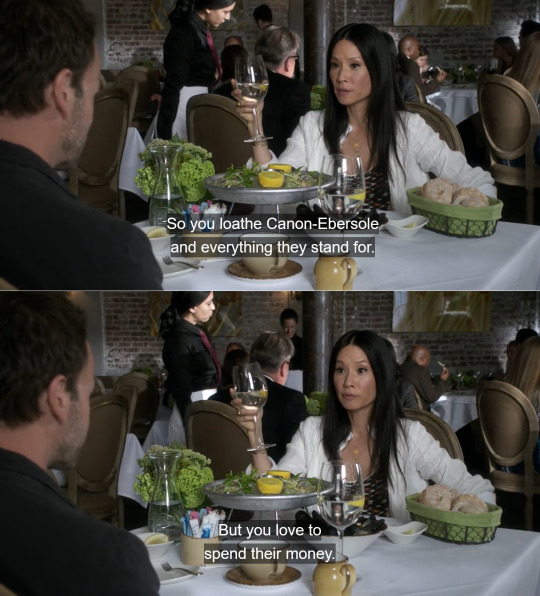
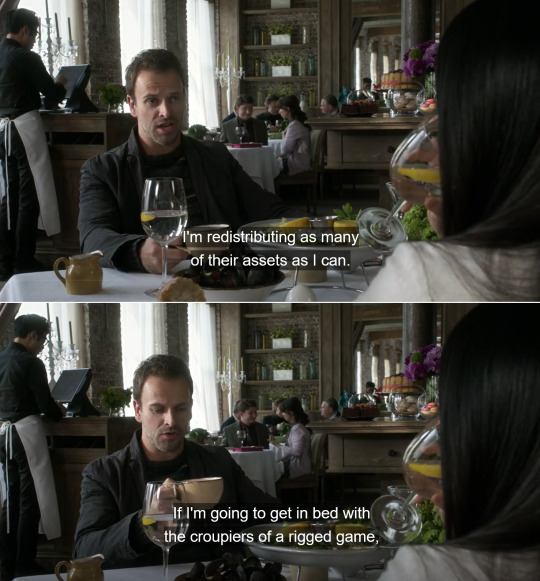
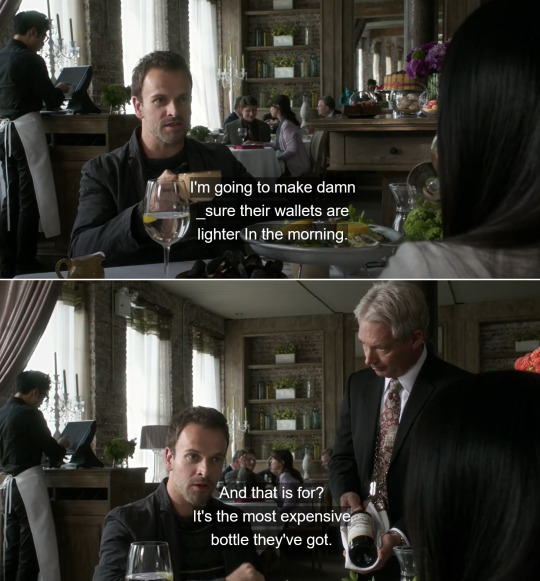

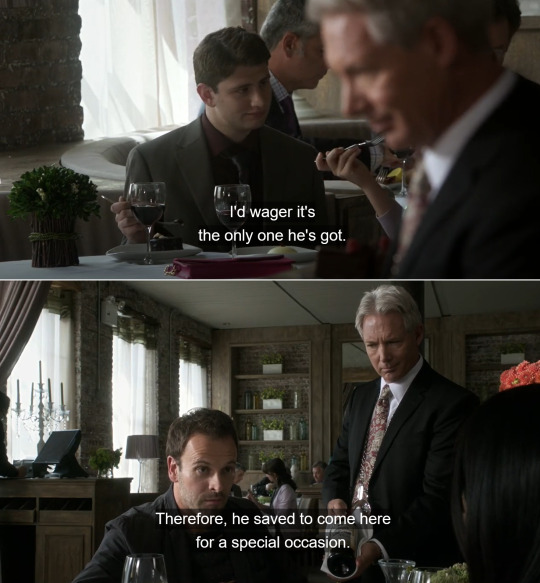
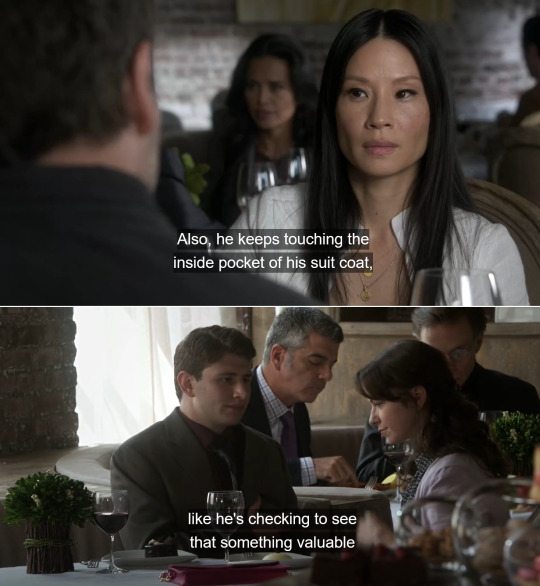
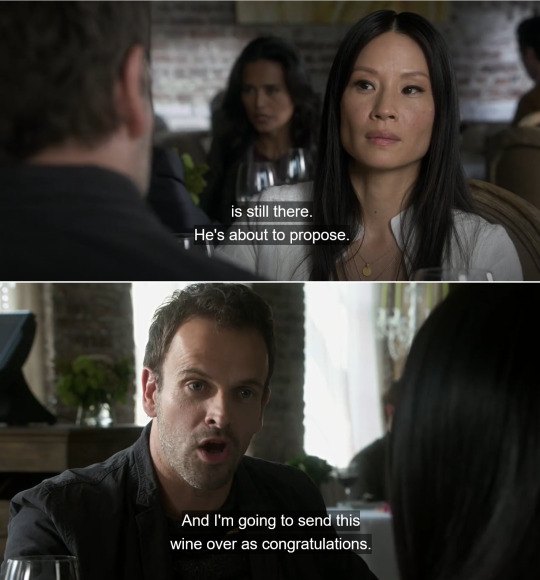

“i wish we could see adaptations where sherlock holmes hates the rich and is allowed to be kind to those around him and uses his abilities to support society’s underdogs” elementary was doing this back in 2012. this was only episode 4.
#sherlock holmes#elementary#joan watson#this show had SEVEN SEASONS#and by its 4th episode holmes and watson had more character depth than a lot of adaptations do in their entire run#this holmes is acd holmes plopped into a modern world and it works so well. SO WELL.
43K notes
·
View notes
Text
Thinking about how Diavolo’s feelings transcend time and how in the Nightbringer UR+ card Demon Lord’s Castle Tour this conversation happens.
When asked, “Do you wish to see your father?”
Diavolo responds:
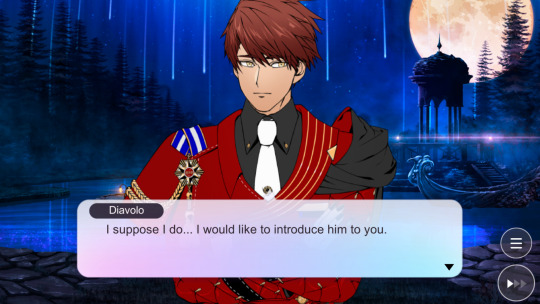
“I suppose I do . . .” isn’t the typical reaction to how a child would feel about wanting to see their parent. Especially when said parent has essentially been in a coma for a year.
Along with how Diavolo describe his father.

It makes more sense why when you learn in Lesson 56 how Diavolo was treated by him growing up.




Diavolo can tell when others are lying but is unable to understand his father’s intentions.
Diavolo mentions that he lived a very sheltered life growing up. That from a young age his father never allowed him a chance to talk to anyone outside the castle.
His childhood friend was Mephistopheles. A demon literally RAISED to be his friend. Putting a barrier between the two because Mephistopheles would put Diavolo on a pedestal.
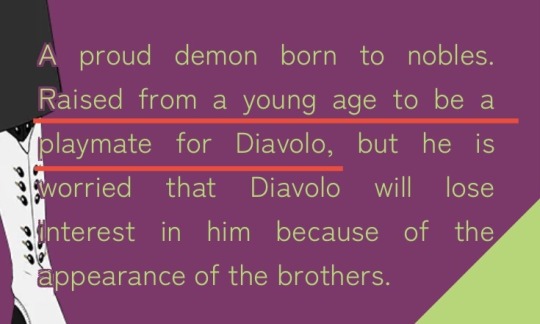
The isolating childhood he experienced riddled with his strict father constantly scolding him.


Despite everything MC is so important to him he wants to see his father again so we can meet.
#Demons and Humans can’t get married even in the present so it adds an extra layer him wanting to introduce us.#There’s a lot more you could add onto this (please do I’d love to hear other’s thoughts).#Like how Diavolo’s childhood affected him just look at the way he describes himself:#“The truth is I am a child in a way. A child who spends his time alone and never gets to do anything interesting.”#A lot of Diavolo’s poor behavior while not excused comes from his childhood.#How Diavolo admits to using his position to force others to do what he wants. Along with how he doesn’t like sharing.#Diavolo’s insecurities in his friendships with others.#Mainly Lucifer and Barbatos which makes sense with how they happened.#IE Forcing Barbatos to become his butler and the oath/deal with Lucifer regarding Lilith.#It’s clear Diavolo is very lonely and carrying a heavy burden.#I like that MCs presence is helping him change into a better person.#Also I don’t think Diavolo hates his father their relationship just isn’t good and very complicated.#Diavolo is such a wonderful character if you have any in-depth posts about him please tag me I’d love to read them!!!#I AM FILLED WITH SAPPY THOUGHTS ABOUT DIAVOLO TONIGHT!!!!#Obey Me#Obey Me Spoiler#Obey Me Nightbringer#OMSWD#Obey Me Diavolo#Diavolo#MaddyMajolish#Is it obvious I can’t sleep because I’m riddled with Blorbo thoughts
5K notes
·
View notes
Text

Gaslighter? I hardly know her!
[First] Prev <–-> Next
#poorly drawn mdzs#mdzs#wei wuxian#lan wangji#jin guangyao#qin su#The parallels to the mulderskully comic were genuine scripting coincidences that I kept in for the irony.#wwx and mulder both have a strong need to show their beloved (investigation) partner the cool thing they just found.#Much to their chagrin and concern.#For as much of a mess the plot gets in The Untamed...one of the things it does probably the best of all adaptions is setting up JGY.#specifically how we spend time getting to know him as a *Regular Guy* around our deuteragonists' age.#I love how he's present in the cloud recess arc! I was rooting for him as a character! The twist villain reveal felt so heartbreaking!#Here in the audio drama (for as much as it does well) we pretty much get 2 scenes tops with this guy before he's villain monologuing.#before this we know him as 1) the guy NMJ yelled at a lot 2) a suspect 3) leader guy Jin Ling was partially raised by.#The elements are there but but not with any particular depth to make him...interesting (in this version).#Sure we get to learn more after the fact but it just falls so flat in comparison B*/#ohhhh noooo the guy we are pretty sure killed a guy is gaslighting his wife and has a secret torture chamber. And he's a politician.#not much of a mystery to it all innit.#Feel free to disagree or bring up differing points btw; I love media analysis convos and this truly is just my opinion.
2K notes
·
View notes
Text
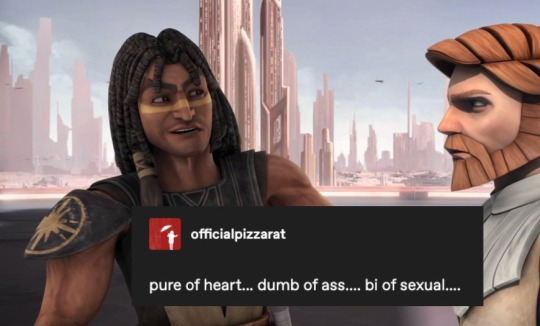
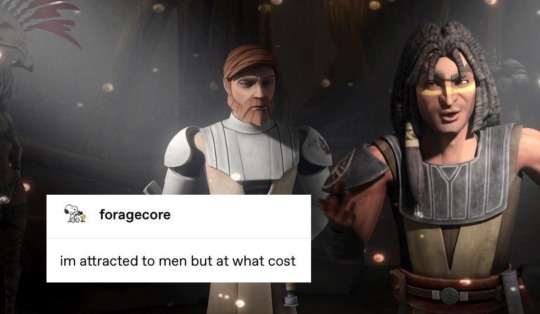
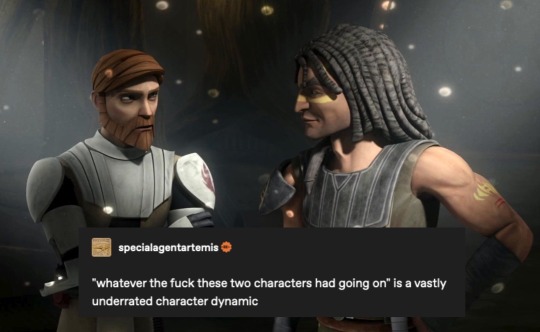

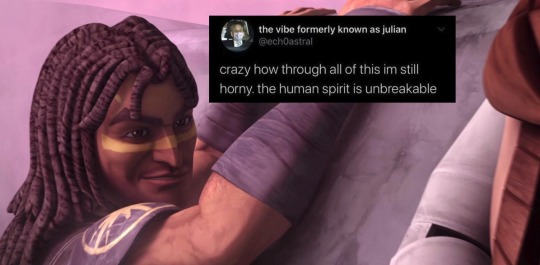
Star Wars: The Clone Wars (4/?) - Quinobi
Star Wars + Text Posts & Headlines
#in retrospect this is based WAY more on my Quinobi headcanons than the reality of Quinlan's character#plus i'd only seen this episode and read the first part of Dark Disciple#so i was going off of that like flirty and laid-back bro energy when making these#i've come to learn broader canon and legends his character is portrayed with a lot more depth#and i regret that these memes don't do that justice#quinlan vos#obi wan kenobi#quinobi#star wars#star wars the clone wars#hunt for ziro#tcw memes#star wars memes#mine#star wars text post#TCW text post#the clone wars
1K notes
·
View notes
Text
Wolfwood executing Rolo in front of Vash and then justifying it as a mercy killing because he sees himself in Rolo will never not fuck me right up
#Trigun#Trigun Stampede#Tristamp#Yeah that's it that's the post#I could go more in depth about it but I've already rambled too much today askdjnaskdjn#I JUST HAVE A LOT OF EMOTIONS OK
2K notes
·
View notes
Text
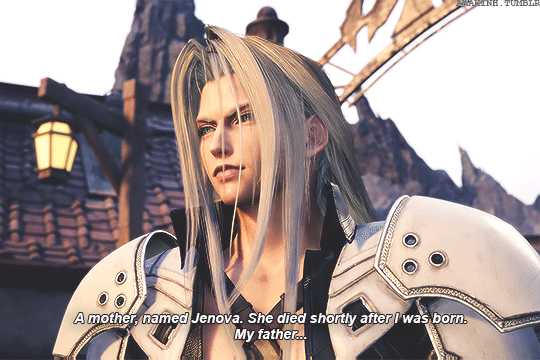

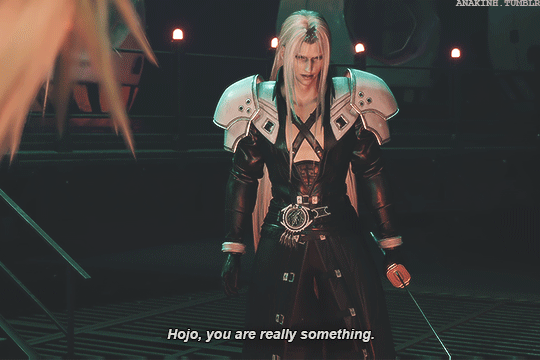
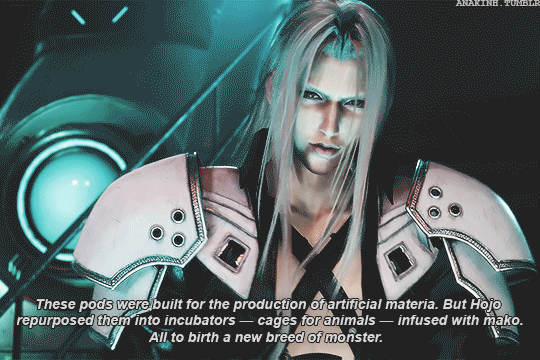

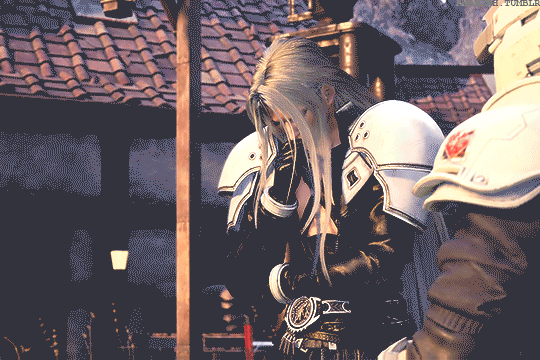
tell me, how does it feel? I have no home, so I wouldn't know
uh... you still got parents, right?
#ffgraphics#ffedit#gamingedit#dailygaming#sephiroth#final fantasy#ffvii#professor hojo#ff7 rebirth#ffvii rebirth#ff7#ffvii rebirth spoilers#mine#minegifs#mineff#anyway some people say that sephiroth doesn't know hojo is his father and i present this gifset as my argument that he does#because if he doesn't... why react like THAT?#i also like this (which is canon) a lot more than the vincent valentine theory#i think it adds a lot more depth to sephiroth and (especially) hojo's character. and god knows hojo needs it#anyway. hoo. lots of gifs in a short amount of time. i've been on hiatus for what? a year? and i'm set to start work soon...#call it my swan song?
504 notes
·
View notes
Text
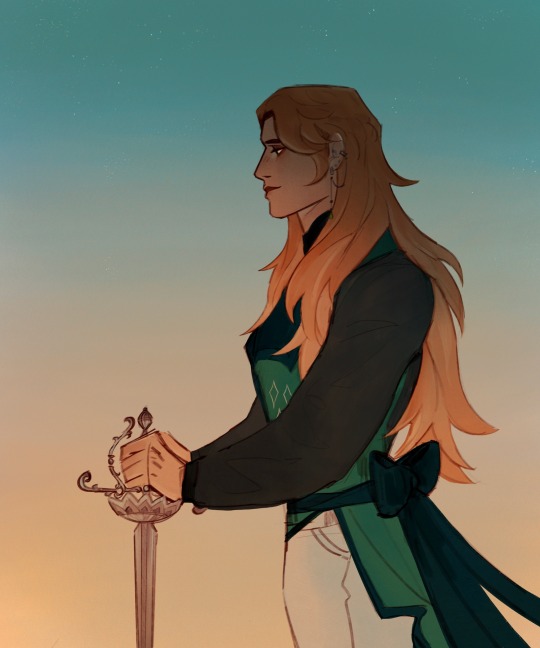
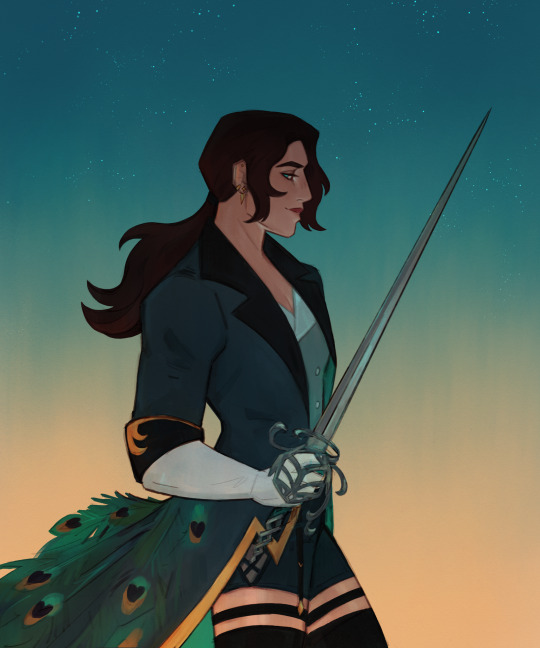

Ocs. The Montagnet siblings. Aurelian, Séraphin, Evangeline
#had to make a piece of seraph to match#and touched up Evangeline’s so there’s more stars and depth#my art#my ocs#I’ve put a lot of thots into what features they each got from their parents#and the clothing styles they each go for w their occupations#aurelian got con's face shape nose and height sabrinas moles warm skin tone green eyes#seraph got con's hair color skintone and nose sabrina's mouth face shape and brows#evangeline got con's face shape eyes and mouth sabrina's nose moles and hair color#aurelian#seraph#digital art#evangeline#artists on tumblr
769 notes
·
View notes
Text

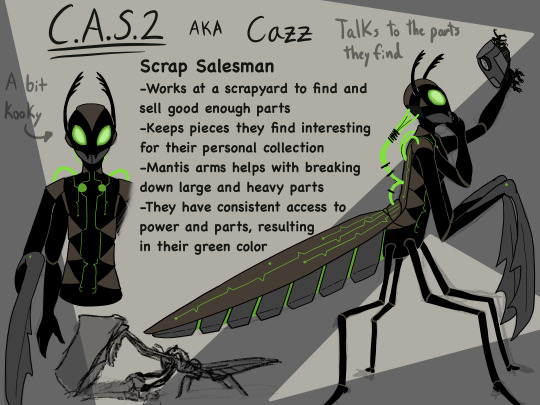
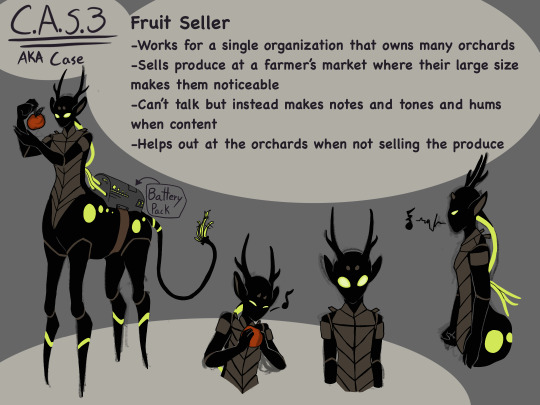
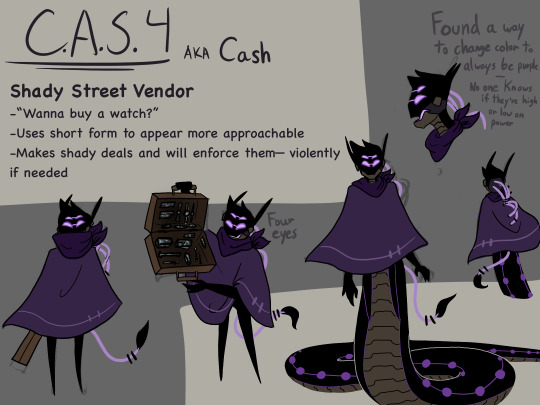
So @somerandomdudelmao made a version of their sona in a dystopia (inspired by @tapakah0 doing the same to theirs) and the person in this ask named the robot C.A.S.5 and I thought, ‘well then there’s at least four other C.A.S. units out and about in the world’ leading to this being the end result! It was a lot of fun to come up with the different customizations each C.A.S. unit has.
also, the design for C.A.S.4 (Cash) was partially inspired by @mobiitez post.
Doodles:

#somerandomdudelmao#tapakah0#my art#Dystopia au#Mob’s character design session#cass fanart tag#i think#I’m probably not going to make more C.A.S. bots but just know C.A.S.7 or Cast is bird based (not sure which bird yet) and blue for my sis#small detail but on Cass there’s broken wires on the back of their head so I decided that they used to connect to the body#Cash hates Castle while Castle is indifferent unless Cash tries to steal from her#Case is vibing with the farm life and making up little tunes#Cazz is a cross between the crazy old cat lady and a backwoods cryptid - they will stare at you from the shadowed depths of the scrap yard#while making commentary to the parts they keep for themselves and of those parts Benji is the favorite#Battery packs for C.A.S. units attach to the things that stick out their backs for the wires - except Cazz who made some internal modificat#No one knows exactly how since the mods are a chaotic hodgepodge of patchwork but they somehow work#Had a lot of fun watching others make stuff for the impromptu dystopia au the vibes of the world were awesome#Technically fanart#so yeah#enjoy!
907 notes
·
View notes
Text
I think it's interesting to look at the 'Mr. Bridgerton' scene as a backdrop for the eventual mirror scene. Firstly, in the fact that I think we've kind of misinterpreted it.
So many people are of the mind that scene's purpose to 'drag' Colin, but really, that scene has 3 primary functions. The first is to inform Colin that Penelope is aware of what he said of her, thus opening the door to clearing the air between them and providing an avenue for which Colin can apologize. The second is to establish the ground that they are currently on: Penelope has given up on the dream of Colin Bridgerton, in particular the perfect prince that can do no wrong, and has made it clear to him. It also creates distance between them that they will bridge.
But the third, and to me the most wrapped up in the mirror and the inner workings of their relationship is that it reveals how Penelope feels about *herself*. It's not necessarily an echo of what the ton considers her as, after all, we have a lot of evidence indicating that, for all intents and purpose, people aren't *unkind* about her, but rather that they ignore her. Audience members recognize this as Penelope's own shyness being the cause, she is often sitting off on the sidelines or not really talking to much of anyone, in the books she's referred to as the 'one who doesn't speak', and her LW business takes her away from being a character in the action of the ton to a bystander, kind of a self-fulfilling prophecy of sorts that perpetuates itself. Pen felt unseen so she became LW to have some power, but then LW herself must remain unseen and Penelope continues to be by design of her own making.
No, I think what it really reveals is that Penelope has incredibly low personal self esteem. We as a fandom has lauded that scene as her dragging Colin, saying that he's cruel and calling him Mr. Bridgerton is absolutely meant to create distance between them, but I don't think she's dragging him.
Because the person she is *actually* dragging here. . .is herself. And it is a general theme in her life. In Whistledown. Aloud. Even with Marina, when she complimented her, she assumes that she's lying. When Edwina says she's wearing a pretty dress, Penelope puts herself down and doesn't believe her, even when the compliment is genuine. In truth, Portia is not seen as being particularly unkind to Penelope. At least, speaking as someone who's mum was *awful* about my size and weight and outfits, Portia is. . .overall rather mild. She's not KIND and loving, not by a long shot, but she's also not targeting Penelope only. She's plenty mean and critical to Prudence, too, even to the point where she foists her off to her own cousin as a pawn piece. Penelope has low self esteem because of a lot of reasons, she's bullied by Cressida (I think a lot of girls are, she was pretty mean even to Daphne in S1) and her family isn't very tender to her, and she's not being pursued at every turn, but part of it is also her own perpetuation.
Listen to what she says "Of course you would never court me" "I embarrass you" "I am the laughingstock of the the ton". She sees *herself* as an embarrassment. She puts *herself* down. Arguably, more so than the ton does. She's meaner to herself than anyone else is, aside from Cressida. And honestly? Looking at Colin's face there. . .he is HURT that she considers herself this way. That she's projecting that onto him. Yes, he's hurt that he hurt her, of course he is, he never wants to hurt her. And yes, he's ashamed that he said he wouldn't court her the way he did and that in doing so, he validated her fears that she is unloved and unwanted, but also because. . .she already feels that way about herself. She's felt that way for years. And it's painful to care about someone, to see them as wonderful, and realize. . .they don't feel the same about themselves at all. I don't think Colin is out here feeling so wounded over the fact that she called him cruel and won't refer to him by first name anymore, but that he's most hurt by what she says about herself.
Because he *doesn't* see her the way she accuses. She says she never expected him of all people to be so cruel, but he feels the same way. He never expected her to be so cruel to *herself*. He wants to go somewhere private, not because she is an embarrassment, but because he wants to have a private conversation with her. Maybe assure her. Maybe explain himself. Maybe hash it out. But god Luke Newton's acting. . .he is *aching* for her. And it feels like he's going to do those lessons not in atonement for what he said (thank god) but to genuinely help his friend who thinks badly of herself. To lift her up. It's not about him at all, not about earning forgiveness, but about elevating Penelope. And that's. . .fuck, I just find that's just so heart stoppingly beautiful.
You can see, in that scene, how much he cares about her. How deeply and genuinely he adores her as a person. And just how painful it is for him to know he has validated, whether on purpose or otherwise, how poorly she feels about herself. How low her self-confidence really is. She is giving him a glimpse into the cracks of her heart, and when he sees them, he wants to reach out with both hands and make it feel better. Make her feel better.
After she says 'even when I change my entire wardrobe', he looks so fucking crushed. So 'don't say that'. So 'you really believe that?'. So 'God, I hate that you think that way'.
Because regardless of it all, he does love her. It's not romantic yet. It's not sexual yet. But he genuinely, truly, from the bottom of his heart, thinks she's wonderful. That was evident even in the 'purpose' scene. Every time Penelope opens up and reveals a facet of herself, he likes it. He likes her barbs and her dreams, he likes talking to her. He likes her. And he feels awful that he hurt her. And he feels awful that she's hurting herself. He loves her. He wants her to love herself.
And that's where the mirror scene comes in. Because the mirror scene isn't about sex, not really. Not entirely, at least. The mirror scene is about *intimacy*. The mirror scene is about being seen. Not just her seeing him, or him seeing her, but for Penelope to see *herself*. In a way, through his eyes. Because hers are biased rather negatively toward herself, which is evidenced in the 'Goodnight Mr. Bridgerton' scene, and in so many little moments we've already gotten where she's literally looking down on herself, feeling down. She doesn't necessarily *like* what's in the mirror, but he does. Because he likes *her*. And he wants to show her that he does. Show her that he finds her beautiful and have her recognize that in herself.
The 'Goodnight Mr. Bridgerton' scene is about Penelope revealing how she sees herself. The mirror scene is about Colin showing her how *he* sees her. The Goodnight scene is about Penelope thinking she means nothing to him, that he thinks of her the way she thinks of herself, that this is how everyone thinks of her, and the mirror scene is a direct response to that: No, he doesn't. No, he doesn't think she's embarrassing. No, he doesn't think she's a laughingstock. No, he doesn't think she's unappealing. And he doesn't think she should, either.
And he's going to show her that. Not just tell her, but show her. The mirror scene is so often a focus on Penelope, so much of Polin is in Penelope's focus, but approaching it from Colin's perspective and his motivations is so fulfilling, too. It's a glimpse into them in conversation, and a demonstrate of how Colin loves her. How Colin loves in general, openly and earnestly and altruistically. How he encourages her to be braver and more confident in herself, bolstering her because he just likes her *that much*. How he finds the most fulfillment and satisfaction in caring aloud. The mirror scene is a demonstration of his heart in reflection.
When Luke Newton said the first word that came to mind with the word 'Mirror' was 'Exposed', he doesn't just mean physically. He means emotionally, too.
God this couple is so fucking good.
#polin#colin bridgerton#penelope featherington#Bridgerton#i love them#but honestly? i think i read too deeply into them#this is the only post about them i'll keep up#but after everything i've seen in this fandom and the promos and the synopsis- i don't think these two are friends#and i think i have given them more nuance and depth than they actually will get#and so i guess they're my dream#this version of them#the version of them that loves each other deeply and sees one another and has tenderness for each other#but everyone else in the fandom was right- we won't get this#we will get penelope needing external validation through the ton's opinion and we won't get colin being a full character#we will get a story based on suffering and holding scorecards against each other#we will get groveling and cold shoulders and drama in place of real growth#i suppose it's just sad for me#because i read so much of what i've thought of these two and i *see* the love i have for them#but bton and this fandom don't have that same love#so i have to let go of that dream#and that's for the best#but as a memento: have this#i've written a lot of love letters to this pairing- consider this one of them
285 notes
·
View notes
Text
i really thought ah yes another episode! more ellie and joel and zombies! and then they gave me a heartbreaking short movie about two gays finding peace & happiness as they grew old alongside one another in a world that at first made them think life was no longer worth living haha hahaha im fine! i’m fine. i’m fine
#bill my beloved#thank god i have therapy tomorrow#they were each others will to live…. ahahahahahaahaha this is my joker#they grew old together…#i was not ready for this#i loved this episode a lot#like the whole setting#the tone the way they gave us more depth of all these characters of joel AND tess as well#and the underlying msg that joel will grow to love ellie as a daughter and fight to protect her#that she will become his purpose#i’m totally fine! not crying at all!#the window scene didn’t destroy me!#tlou#tlou spoilers#tlou hbo#the last of us#the last of us spoilers#og
1K notes
·
View notes
Note
What do you think of Ozai as a villain? 👀 i'm seeing people saying the live action Ozai is better and i'm like "nah". They missed the point of the character
i mean i think a lot of people misunderstand ozai because people want a compelling character (especially a compelling villain) to be “layered and complex” in a very specifically emotional sense. but i do think ozai is layered and complex, simply in a different way that people expect. azula, for example, is a great villain because she is psychologically complex, and every action and motivated is entrenched in layers of nuance. but ozai is thematically complex, functionally layered. his underlying emotional motivations, however, are beside the point.
ozai’s narrative function is primarily to be metonymically figured as the embodiment of patriarchal and imperialist violence. ozai performs this function through interconnecting the domestic (his abuse of his wife and children) with the national (his role as sovereign of an empire). zuko’s disavowal of ozai in “the day of black sun” very explicitly ties his personal abuse to the logic of imperialism, and zuko denounces both logical tracks through acknowledging their interrelation. it’s hardly an uncommon character construction either: the domestic (specifically, the patriarchal nuclear family model) as microcosmic of the societal (specifically, patriarchal societies that are otherwise organized along unjust hierarchies) is prevalent across plenty of narratives, from the house of atreus to king lear to succession.
my personal favorite example of this trope as it is employed is in palace walk by naguib mahfouz, because al-sayyid does function as sovereign of his house, but he is also grappling with the consequences of being a colonized subject, and that colonial shame and humiliation both complicates his relationship to power but also reifies his patriarchal role within his family, his very real pain and disempowerment leading him to exacerbate his domestic abuse and tighten his control over his wife and children. al-sayyid is also, notably, not strict and controlling beyond the purview of his family, but within his own house, he very deliberately positions himself as an inviolable patriarchal authority.
however, unlike al-sayyid, ozai is a sovereign in every sense of the world, and even positions himself as akin to a god. but, as we can infer from “zuko alone,” ozai is not impervious to patriarchal abuse (or he wasn’t before ascending the throne), and thus has suffered his own shame and humiliation fostering his god complex due to compensation (and through the internalization of the logic of patriarchal abuse). ozai perpetuates the cycle of abuse as he, too, once suffered it (much like logan roy, to name another excellent example of this archetype). so while ozai is no longer a victim in any sense of the term, it is important to understand the psychology underlying his belief that he is ontologically deserving of the undivided respect and submission of the entire world due to his position of power.
ozai genuinely believes that he was teaching zuko respect, because respecting his authority is one of the values ozai holds most dear. because, of course, to speak out against ozai as an individual is to speak treasonously of the fire nation, and vice versa. and he expects his children to display their unquestioning loyalty to the Father(land) above all. the second they question him or confuse that priority in any way, they have irrevocably forsaken him and thus must be discarded. that is the logic of (to quote utena) a man who has made himself “end of the world.”
moreover, the other most crucial aspect of ozai’s character is how he is framed. until book 3, we never actually see his entire face. he is always a goatee, a spaulder, a disembodied smirk, a voice echoing through the flames, a crown. ozai as metonym goes both ways. and it serves to emphasize his ominous nature, as someone who is so powerful that we cannot truly view him head on. he’s framed in an almost godlike way.
and then, in “the awakening,” we see him without reservation. he is a tall, imposing man, but he is also, fundamentally, just a man. in “the headband” we see his face through a fire nation propaganda poster, as if to imply that his face is not more sacred than any other face. his poster is immediately followed up with aang’s recreation of his portrait with noodles. before book 3, holding ozai’s gaze is impossible, as he is merely a looming spectre. but book 3 immediately and ruthlessly undermines the notion they have been building up for two seasons, and through comedy, no less. ozai may be uniquely powerful and uniquely evil, but he is still just a man, and by the time he crowns himself phoenix king, destroyer of worlds, we are well-aware that he is not innately, divinely superior in any way, and his fascistic performance simply looks ridiculous.
unlike azula’s claim that “the divine right to rule is something you’re born with,” there is nothing unique or ontological about the role of the emperor. there is nothing ontologically superior about the colonizer’s relationship to the colonized besides the material dynamics of power informing their relationship. the father as head of his family is not ontologically necessitated any more than the structure of the nuclear family is predicated on innate anthropological roles rather than being socially constructed and maintained through systemic violence. ozai is not ontologically special, and his claim that he is seems even sillier as he goes up against the avatar, who actually truly is.
when ozai faces aang in the final battle, it is a significant fight because it represents the culmination of all the ideals aang has constantly fought for and asserted within ozai’s imperialist paradigm. and by refusing to submit to ozai’s logic of domination, aang disempowers ozai wholly. not because lack of firebending makes one totally powerless, but because lack of bending makes one powerless within ozai’s logic. aang renders ozai victim to his own ideology, playing his own imperialist dogma against him. instead of killing ozai in combat, as ozai expects, aang humiliates him by asserting his cultural values and their continued relevance over ozai’s values. the culminating battle against ozai, with the spiritual light that threatens to overtake aang, is a battle of one ideology winning out over another. it is the culmination of a century of genocide and colonialism by an imperialist power. it is the undermining of ozai’s entire worldview.
ultimately, we don’t need to see a lot of ozai to understand him. we can understand ozai perfectly through zuko and azula, because he positioned them as extensions of himself and thus their respective embodiments are simply their ways of performing him (azula is obviously a better actor). his complex psychology is beside the point, because his narrative function is to represent the imperialist forces that aang must battle. and they do this by establishing him as an ominous and terrible deified man, and then undermining him as little kore than a human being with an incorrect worldview. so he is interesting, not because he’s “complicated,” but because he reflects the central tension of the show in a satisfying way, and that’s what matters.
#lilith-91#asks#analysis#ozai#synthesis#azula&ozai#ozai&zuko#azula#zuko#putting this under a readmore even tho it’s only 10 paragraphs….. for shame#im on mobile rn but if u go thru my ozai tag you’ll also find a lot of other posts and more in depth analyses of the things i cover here#im sick of linking to other posts tho#at this point everyone should just be wholly familiar with my oeuvre#(im lazy)
173 notes
·
View notes
Text

Scout and his Ma :]
#scout definitely got his cockiness and stupidity from his ma#i mean obviously but also i feel like scouts Ma is/was a cocky hot headed know-it-all but only when it comes to street smart typa stuff#she knows how to throw a mean right hook and can out-drink half the guys at the bar but put a book in front of her and its like the world i#of course having 7 kids made her more level headed yknow wanting to keep them from going to jail for the rest of their life and such#anyhoo thats it sorry for the rambling i just like scouts ma a lot and really wish she had more character depth#art#digital art#my art#tf2#tf2 fanart#team fortress two#tf2 scout#tf2 scouts mom#scouts ma
181 notes
·
View notes
Text
Shuro thoughts (1201 words)
If i had to assign a term to Shuro that describes his character, it’d probably be ‘a lack of connection with others’, many of shuro’s relationships in dungeon meshi follow a similar pattern, in that they're all very neutral. He feels like he’ll constantly be in his dad’s shadow no matter what he does, leading to him not trying much, along with some resentment towards him. There’s also his relationship with Maizuru,who was one of the more positive figures in his life who he ends up blocking out as he grows older. Even his relationship with Hien is kinda. Nonexistent. They used to be quite close when they were kids, but their friendship eventually deteriorated when they grew older.
It makes sense since the difference in status is more prevalent, but this made me think about how he reflects Laois. Even though they both have similar upbringings, with fathers who are in a leadership role which they would benefit from. Laios is still ostracized from the rest of his village, and pretty early on ends up leaving to become a soldier, where he ends up even more ostracized. It’s only when he leaves the army and goes to the island, that he becomes an adventurer and meets his party, where he finds companions who he’s on mostly friendly terms with. Despite everything he’s able to create his own life outside of his family.
Meanwhile Shuro has presumably lived with his family up until he gets sent off on his adventure. He’s constantly in his fathers shadow, and everyone that he’s surrounded with is in some way related to his father. The retainers are all employed under his father and are more or less lended to him. Even when he leaves for the island, he’s still connected to him by the quest that he’s sent on, and his retainers that follow him. He doesn’t come to the island for himself, it’s for a competition arranged by his dad.
Another way that they’re foils is through their siblings. Laios’s relationship to Falin is incredibly important to the story. They both clearly love each other and left home to find their own path side by side. But Shuro and his siblings have a large distance between them. It’s never stated why, but I don’t think it’s made better by the whole, competition for inheritance thing. I think it’s also interesting how Laios’s adventure brings him closer to Falin. While Shuro’s takes him away from his brothers, furthering the gap between them.
Even in laios’s party, where he’s able to make connections with people not from his home, he still can’t really connect with others. Namari and Chilchuck both drink after work, Falin and Marcille are besties and all get along pretty well. They’re all comfortable enough with each other to speak their mind and jokingly riff on each other, all except for Shuro, whose relationship with them is much more like co workers.
It’s the same in his old party. Hien and Benichidori are able to form a friendship with each other, and Tade forms a friendship with Izutsumi. But Shuro is distant from them all, to the point where him going “you guys did a good job, I’m sorry I dragged you guys down here” is enough to bring Maizuru to tears and confuse the hell out of them all. While Laios’s party criticizes him pretty openly, Shuro’s party instead just goes with what he does.
One similarity between him and Laios that I didn't really notice until now is that they both lack real friends, just for different reasons. Laios can’t find real friends because he can't read social cues or socialize well with other people, but he still tries to reach out to people even if things end up sour. Meanwhile Shuro doesn't have friends because he doesn't try to connect with other people, he's passive and only makes connections if they come to him first, ending in friendships that he’s not even happy with.
I also think it's interesting how he has a special relationship with both Touden siblings, just that one is out of love and one is out of hate 💀 Both of these relationships lead to him breaking out of his passive personality and making his own decisions instead of just moving through the motions. By falling in love with Falin, he makes the decision of finally leaving the party in order to form his own rescue team. Due to his hatred of Laios, he ends up getting into a fist fight and finally showing his true emotions and feelings. Both Touden siblings influence Shuro to make active decisions throughout the story (Proposing to Falin, leaving the party, deciding to turn marcille in, fighting Laios, etc). Even though these are bad decisions, (proposing to someone without any kind of romantic relationship first, fist fighting someone while half your party is dead), they are still him finding a voice. Both Laios and Falin make Shuro break away from what's expected and make his own path, even if it's very brief, and even if those decisions were very stupid.
Even though Shuro’s whole reason for coming to this island is the quest he’s sent on by his father, we don't really get much of that in the main manga, instead more focus is put on his relationship with Laios and Falin, (something something even narratively he finds his own path by having an arc based on his relationships instead of his quest). If he had an arc in the manga, I presume it would be around him finally understanding Laios? And eventually repairing the relationship between them and forming a real relationship (Though honestly i'm not sure about this). But nonetheless i think Shuro’s relationship with Laios does improve, even though he says he hates Laios, he also admits that he's envious of him.
The two of them have personalities that fundamentally clash with each other while reflecting the other. Shuros passiveness and Laios' lack of observation skills basically guarantee their relationship would go south, but they do manage to pick up the pieces, after beating the shit out of each other.
Laios and Shuro have a genuine talk where Shuro admits his envy, and even offers Laios a way to escape to the east, despite not being asked to. And in the final chapters, Shuro ends up hugging Laios with a genuine smile, despite not being comfortable with physical contact. Even though the two had a rough fight, their relationship manages to recover and become somewhat positive.
By the end of the story, even though it's implied that Falin rejected Shuro (good for her), he's still on good terms with the Toudens. He finally makes his own decisions and speaks, and even though things got kinda ugly, he's still able to have a positive relationship with Laios and Falin, not as besties or as a married couple, but just as fellow people. He finally finds his voice and speaks up, end creates connections by the end of it.
If anyone would like to add more to this or has points they wanna bring up please do ^^, these are just my disorganized thoughts that i finally wrote down.
#dungeon meshi#toshiro nakamoto#shuro#shuro does a lot of unlikeable things (atleast compared to other main characters) but i think that hes also got alot of depth#with his whole family and relationship situation#this is a very amatuer analysis and im not really experienced with this kind of writing?#so if this is worded weirdly then sorry ^^'#also it would be cool to see what other people think#and if i accidentally misinterperated his character 😭#WAIT I FORGOT THE READ MORE
166 notes
·
View notes
Text
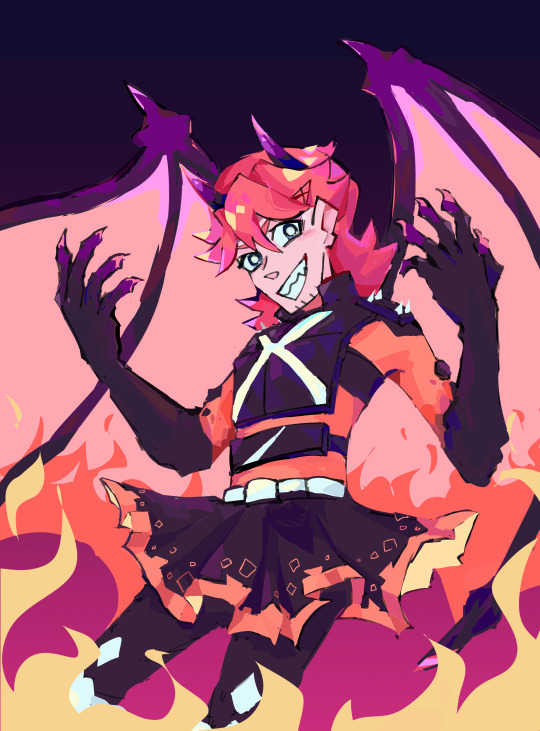
The greatest villain of all time!!!!
#felt like drawing this (very cool) dude#while listening to anime campaign#y'know what? that was a bit of a mistake. AC giovanni is very fundamentally different than EE giovanni#and seeing him be mean to Molly makes me sad :(#also the dick jokes were cursed#other than that honestly it was pretty fun!#It's nice to see Sylvie since he got cut in prison of plastic#and it's not like giovanni wasnt funny; just that ee gio was given a lot more depth and heart#epithet erased#sketchz's stuff#giovanni potage#prison of plastic#EDIT: I JUST REALIZED I DREW FIRE ON HIM?#IM SO SORRY MOLLY#pretend its just there for aesthetics and not actually hot and fire
290 notes
·
View notes
Text
ive just said it but i’m reiterating, the biggest hang up with boone for me is the fact that he quite literally wants to die heroically defending a refugee camp to absolve himself of his crimes. a refugee camp, mind you, that is using the homes and beds and abadoned supplies of the people HE had a hand in massacring and displacing. he doesnt want to submit himself to the khans law and risk suffering a brutal death at the hands of some nasty raiders
#like i said. i really like boone as a character. but i cant stand him at the same time#hes involved in A Lot of my stories because of how much depth he has and i have a bunch of stuff planned about him and carla and my khan ocs#but i feel that my interpretation of him is a lot more brutal than people would like so i dont really publish those ones#Friendly Fire is the closest i got lol#txt
612 notes
·
View notes
Text


the full animatronic alchemist and his little brother….. and some very familiar looking homunculus …. (ok ok im done im done)
#five nights at freddys#michael afton#evan afton#elizabeth afton#fnaf#arts#seriously im pulling from the depths of my fma knowledge base here#like i know the transmutation to homunculs pipeline is a lot more complicated than this but#im just going with parallels to what happens in the anime…..
585 notes
·
View notes